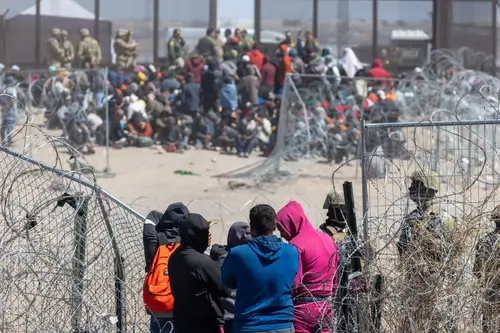By Brian Figeroux, Esq. | Editorial credit: David Peinado Romero / shutterstock.com
The Laken Riley Act has garnered significant attention in Congress, mainly dividing lawmakers along partisan lines. Supporters argue that the legislation is necessary to ensure public safety and protect communities from repeat offenders who, under the current system, may evade detention or removal. They highlight cases like Laken Riley’s as evidence of systemic failures in immigration enforcement, calling for stricter measures to address gaps.
Opponents of the Act, however, contend that its provisions risk exacerbating existing issues within the immigration system. Critics warn of potential overreach, including the unnecessary detention of individuals for minor offenses or those who may not pose a genuine public safety threat. Concerns about racial profiling and the disproportionate targeting of marginalized communities have also been raised.
The Act will likely face legal challenges. The provision empowering state attorneys general to sue federal officials, in particular, raises constitutional questions about the balance of power between federal and state governments in immigration enforcement.
Potential Impact on Immigrant Communities
The Act’s emphasis on mandatory detention for nonviolent crimes like shoplifting has sparked fears of increased incarceration rates for noncitizens. Advocacy groups argue that this could discourage immigrant communities from engaging with law enforcement, even as victims or witnesses, for fear of deportation.
Furthermore, critics note that expanding mandatory detention could strain already overcrowded detention facilities, leading to increased costs and potential human rights concerns. The potential impact on families, particularly those with U.S. citizen children, has also drawn significant attention.
Support from Victims’ Advocacy Groups
Advocacy groups supporting crime victims have voiced strong support for the Laken Riley Act. They argue that it prioritizes the safety and well-being of victims and their families while holding offenders accountable. By mandating detention for individuals who commit theft-related crimes, proponents believe the Act could serve as a deterrent to future criminal activity and prevent further harm.
___________
Related News:
Letitia James Releases Letter Urging U.S. Senate to Reject the Laken Riley Act
___________
Visa Sanctions and International Relations
The provision imposing visa sanctions on countries that refuse to accept deportees introduces a new layer of complexity to international relations. While this measure is intended to increase cooperation with deportation efforts, it risks straining diplomatic relationships with certain countries. Critics argue that such sanctions could have unintended consequences, harming U.S. businesses or tourism industries that rely on travel from the affected nations.
Implementation Challenges
If enacted, the Laken Riley Act will require significant resources for implementation. U.S. Immigration and Customs Enforcement (ICE) would need to expand its capacity to identify, detain, and process individuals meeting the new criteria. Critics question whether ICE’s current infrastructure has to handle this increased workload without compromising other enforcement priorities.
Conclusion
The Laken Riley Act represents a bold and controversial step in U.S. immigration policy. While its supporters view it as a necessary response to public safety concerns, its critics warn of potential overreach and unintended consequences. The Act’s future depends on legislative negotiations and public support, and its implementation would undoubtedly shape the national conversation on immigration enforcement for years to come.

